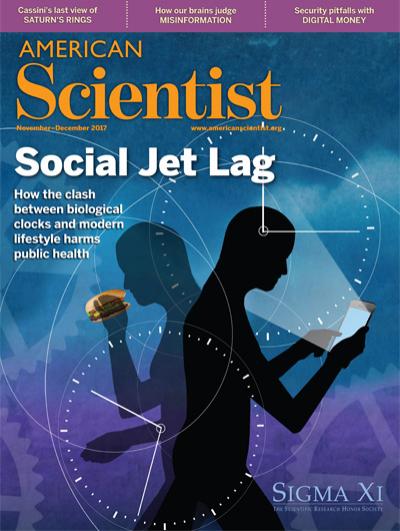Magazine
November-December 2017

November-December 2017
Volume: 105 Number: 6
Technology has extended the times of day when people can be active and has allowed for connectivity at any time of day. A growing body of research shows that the biological clock is affected by light exposure, especially at certain times of day, which in turn can affect all sorts of biological processes necessary for health, including sleep, focus, and metabolism. More people seem to be experiencing social jet lag, when our body rhythms are out of sync with the day-night cycle. This lack of synchrony can have serious public health consequences; for example, it has been linked to sleep disorders, obesity, and mental disorders. In “Adapting Your Body Clock to a 24-Hour Society”, circadian biologists Alexis Webb and Erik Herzog explain how the biological clock sets and keeps time, and what solutions are under study to help people sync up with healthy daily routines for sleeping and eating. (Cover illustration by Michael Morgenstern.)
In This Issue
- Art
- Astronomy
- Biology
- Communications
- Computer
- Engineering
- Ethics
- Evolution
- Mathematics
- Medicine
- Physics
- Policy
- Psychology
- Technology
Cassini and the Rings of Saturn
Matthew S. Tiscareno
Astronomy
As one of its final scientific feats, the accomplished robotic spacecraft returned unprecedentedly detailed data on the material encircling the giant planet.
The New Language of Mathematics
Daniel S. Silver
Communications Mathematics
Is it possible to take all words out of mathematical expressions?
The Persistence and Peril of Misinformation
Brian G. Southwell, Emily A. Thorson, Laura Sheble
Anthropology Communications Psychology
Defining what truth means and deciphering how human brains verify information are some of the challenges to battling widespread falsehoods.
Scientists' Nightstand

Sumptuous Science
Dianne Timblin
Art Biology Technology Natural History Review Scientists Nightstand
Three recent releases demonstrate just how vibrant science-related titles can be.

Beyond Data-Driven Policing
Andrew Guthrie Ferguson
Computer Ethics Policy Excerpt Scientists Nightstand Social Science
In his book The Rise of Big Data Policing, Andrew Guthrie Ferguson examines the good, the bad, and the ugly of law enforcement’s increasing reliance on big data analysis and its driving algorithms.






